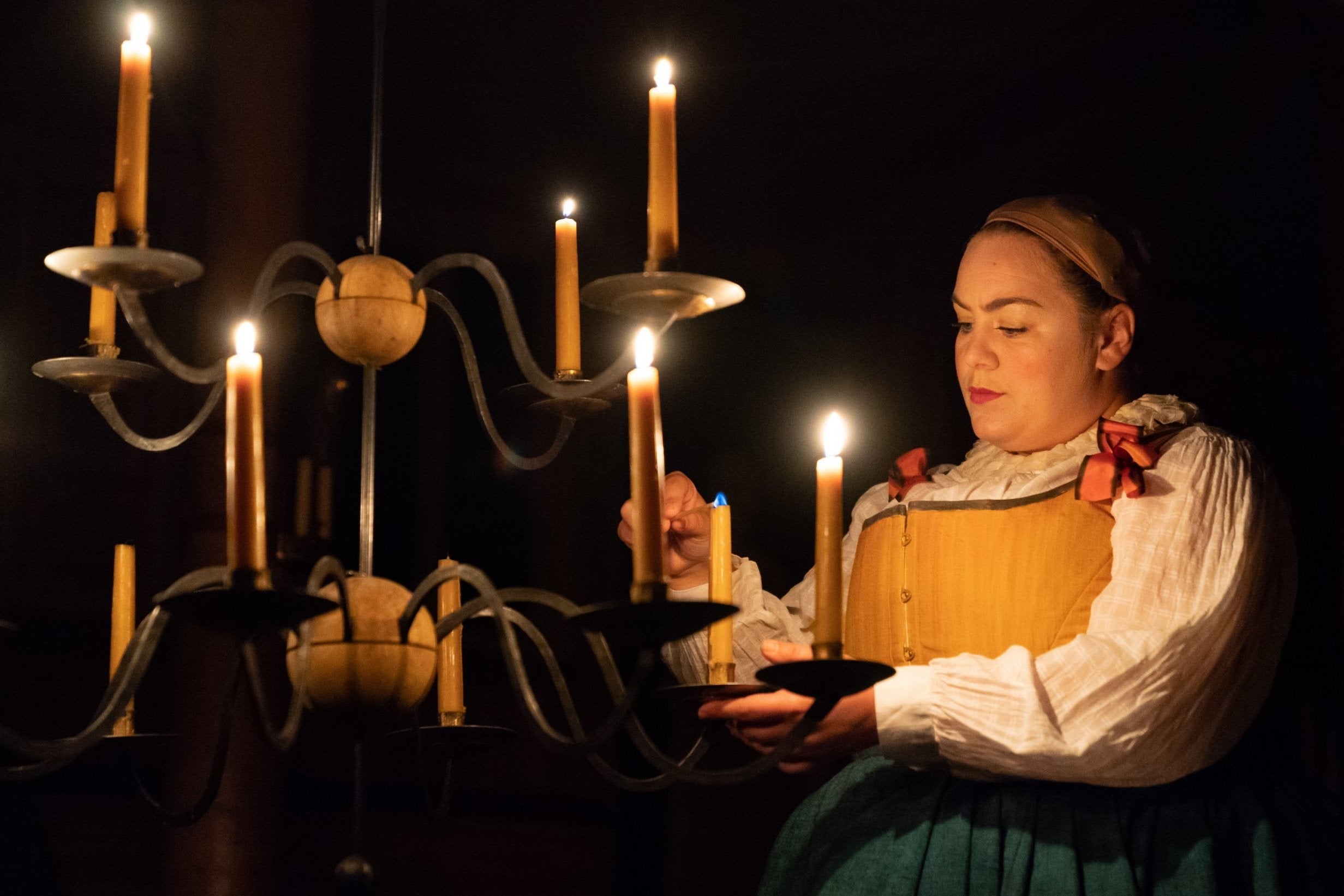Love's Labour's Lost, Sam Wanamaker Playhouse, London, review: Enchantingly daft and dexterous
There’s real delicacy of feeling in this production as well as full-blooded fun

High-minded vows about abstinence go together with the spirit of comedy about as happily as a stern regime of weight-watching and the notion of Mardi Gras. So it proves in Love’s Labour’s Lost, the early Shakespearean play now revived in an enchantingly daft and dexterous production by Nick Bagnall, staged in the intimate, candlelit confines of the Sam Wanamaker Playhouse.
The young King of Navarre and his followers (slimmed down to two here) take an oath to devote themselves to three years of study and fasting and to forswear the company of women who are not allowed within a mile of the court. It’s a sophomoric scheme that reeks of male self-importance and insecurity.
And it soon gets its comeuppance when the Princess of France and her ladies arrive on a diplomatic embassy, causing an epidemic of oath-breaking. The bright, linguistically exuberant luxury of youthful raillery is put into a sudden, sobering perspective when the news arrives of the death of the Princess’s father.
The play is sometimes set in the long golden summer of 1914 which certainly suits the “never such innocence again” (Philip Larkin, "MCMXIV") mood of the final act and the unorthodox, provisional ending where the women suspend romantic resolutions and put the insensitive men on a probationary period of “twelve month and a day”.
Bagnall, taking his cue from the musical-box beauty of the Playhouse’s interior, has opted instead to emphasise the fairy tale aspects. The theatre begins in complete darkness (to which it, very beautifully, almost returns at the end), the cast gradually lighting and then snuffing the chandeliers.
Kirsty Woodward’s gangly, bespectacled Princess of France is the centre of attention. The production fast-forwards to the moment in act five when she is about to receive the awful news of bereavement.
But she puts this on hold and irritably kicks her trunk from which emerge the characters of the comedy who descend back into it at the conclusion. Lovely harp and cello music give the proceedings the feel of a magical, intricate toy.
The fact that we have already seen the ladies gives added irony to the opening scenes and the self-deceived posturing of the men which is deliciously caught by Paul Stocker as the King, Tom Kanji as Dumaine and Dharmesh Patel, excellent as Berowne, the most complex and least deluded of them.
Love’s Labour’s Lost is a play that groans with dense verbal wit and the production succeeds in vivaciously marrying this with the goofball slapstick. Take the great scene where the King and his lords lie in hiding and eavesdrop on one another as each, mistakenly thinking he’s alone, confesses his true feelings about love.
Very amusingly, it’s as if Kanji’s Dumaine is taken over by some erotic demon that causes him to cast off his shirt and raunchily groove all over the stage.
Jos Vantyler is inspired as Don Armado, hilariously capturing the mangled verbal extravagance of this Spanish grandee (“it is the king’s most sweet pleasure and affection to congratulate the Princess at her pavilion in the posteriors of this day, which the rude multitude call the afternoon”) and the barking, self-besotted attitudes that make it no surprise that Don A is a compatriot of Salvador Dali.
The character is like a funfair mirror reflecting the folly of the lords. Part of the charm of the production is that it’s played a tight company of eight (so Paul Stocker, for example, doubles as the King and the windbag pedant, Holofernes).
Much less conventionally, Vantyler plays both himself and, switching from hissing Hispanic to yapping Northern, his own diminutive page (“my tender juvenile”), Moth. The resulting schizoid conversations and the solicitous care for Moth’s person are a blissfully crackpot fancy.
Jade Williams brings a searching eloquence to Rosaline and firmly establishes with Kirsty Woodward and Leaphia Darko the superior insight of the women. The two complementary songs to Spring and Winter at the end are ravishing – chastening but not without hope. There’s real delicacy of feeling in this production as well as full-blooded fun.
Join our commenting forum
Join thought-provoking conversations, follow other Independent readers and see their replies
Comments